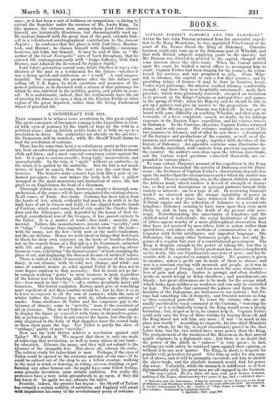A CONSPIRACY FOR 1851.
NEXT summer is to witness some revolution in this great capitaL The great concourse of foreigners coming to the Exposition is view- ed with eyes of jealousy by the timid, of hope by the wild in a political sense ; and an artistic public looks to it with an eye to a revolution in dress. The authorities are already on the qui vive : the Democrats will be watched ; while Mr. Sheriff Nicoll claims to lead the revolution of costume.
There has for some time been a revolutionary party in this coun- try, bent on subverting our institutions so far as they relate to broad cloth and linen ; and a most especial conspiracy exists against the hat. It is open to serious assault ; being ugly, inconvenient, and uncomfortable. In the rain, it " spoils " without an umbrella ; in the wind, it is spoiled by the umbrella. But the hat is not much worse, at least in aspect, than the coat; nor the coat than the trousers. The trousers make a man's legs look like a pair of ex- humed gas-pipes ; the coat makes the body look like a pillow wrapped in the most monstrous and fantastical of cases; the hat gives to an Englishman the head of a chessman.
Thorough reform in costume, however, awaits a thorough com- prehension of the causes which have originated the existing abuses. It all comes of Trade—free trade. Costume has been taken from the hands of Art, which, evidently had much to do with it in the high days of art in Greece and Italy ; it has slipped from the hands of Fashion, which owed some kind of rule under the Charles Bran- dons and the Ethereges; and, degraded by the beaux of that be- sotted, unwsthetical wra of the Georges, it has passed entirely to the Tailor. It is a matter of trade—free trade ; anarchy com- mercial. Tailors, like manufacturers, invent some "novelty," and it "takes." Costume thus originates at the bottom of the scale— with the many, not the few—with mob or the mob's tradesman, not the one dictator. Hence we walk about in things that first learn to blush for their own existence on the backs of headless blocks, not on the comely frame of a Raleigh or a Be Grammont, animated with life and grace. We are but tailors' blocks, moving adver- tisement-vans, exhibiting "the dismal science" of trade usurping the place of art, and displaying the diseased dreams of unidea'd tailors.
There is indeed a limit of necessity to the exercise of the tailoric fancy, in our climate, with its cold, wet, change, and wind : our sense of comfort makes us rebel against Tailor if he does not in some degree conform to that necessity. But he needs not go far : he compels walking " gents" to wear trousers in mud, regardless of the labour lost on brushing adhesive oozings of the blue clay, &c.—how much in that " &c."!—off a surface peculiarly hairy and tenacious. His horrid coadjutor, Hatter, must give us something more repellent of wet than cambric would be ; but he does it so as to leave us exposed to all the sun of summer; while the rain of winter bathes the Cockney face with its wholesome solution of smoke. Some obedience do Tailor and his congeners pay to the tyranny of climate, some to "novelty," none to the essentials of art in costume. They do not follow the canon that costume ought to display the figure or conceal it with forms in themselves grace- ful or picturesque. They do not conceal the figure, but obtrude it ; only disguised in the form of that shapeless mass the coated body or those slack posts the legs. For Tailor is partly the slave of "cabbage," partly of mere "novelty." Now can the bold Briton achieve a revolution against said Tailor? We doubt it. We suspect that there is only one mode of achieving that revolution, as well as many others in our land— by education. Educate the many, and they will not submit to the tyranny of the incapable few. But above all, educate the tailor. The noblest study for tailor-kind is man. Perhaps, if the eyes of Tailor could be opened to the external anatomy of our race—if he could be enticed out of the shop to see a fellow creature walking in the mud or wind, or dancing, or riding, or even standing, or per- forming any other human act—he might have some fellow feeling, some genuine invention, some artistic ambition. For really the profession have a very noble groundwork to go upon, if they did but know it. So again we say, educate the tailor.
Possibly, indeed, the process has begun : the Sheriff of Tailors has evinced a certain nobility of ambition, and England will await with impatience his essay in the revolutionary poesy of costume.


























 Previous page
Previous page